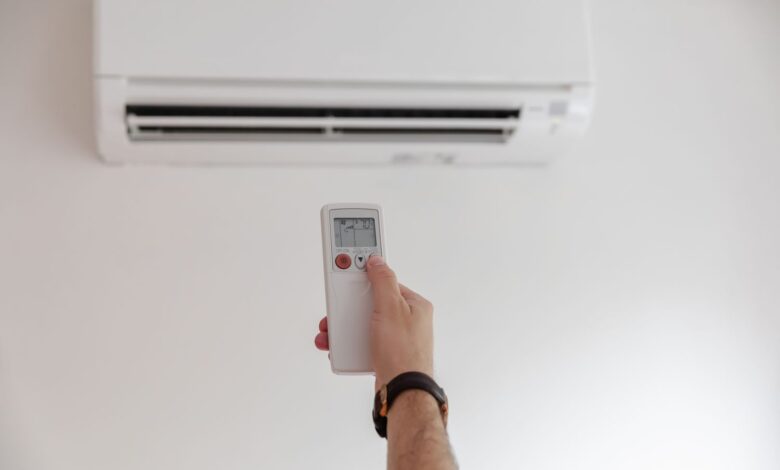Air Conditioners Negative Effects On Your Health Surpass Its Benefits

Air conditioners are devices that cool down indoor temperatures by removing heat and humidity from the air. They are widely used in homes, offices, cars and other places to provide comfort and relief from the scorching heat of summer. However, air conditioners also have some adverse effects on our health and environment that we should be aware of.
Here are some potential side effects of air conditioners on health:
- Dry eyes: Air conditioners reduce the moisture level in the air, which can cause dryness and irritation in the eyes. This can affect people who wear contact lenses or have dry eye syndrome. Dry eyes can also lead to blurred vision, redness and inflammation. To prevent this, you should blink more often, use artificial tears or eye drops, and avoid direct exposure to the air conditioner vents.
- Dehydration: Air conditioners can also dehydrate your body by making you sweat less and lose water through breathing. Dehydration can cause headaches, fatigue, dizziness and nausea. It can also affect your skin, making it dry and flaky. To prevent this, you should drink plenty of water, eat fruits and vegetables with high water content, and avoid caffeinated and alcoholic beverages.
- Respiratory problems: Air conditioners can circulate dust, pollen, bacteria, viruses and other pollutants in the air, which can trigger or worsen respiratory problems such as asthma, allergies, sinusitis, bronchitis and pneumonia. Air conditioners can also cause dry throat, nasal congestion and rhinitis (inflammation of the nasal mucous membrane). To prevent this, you should clean and maintain your air conditioner regularly, change the filters frequently, use a humidifier or a vaporizer to add moisture to the air, and avoid smoking.
- Lethargy: Air conditioners can lower your body temperature and metabolism, which can make you feel sluggish and sleepy. This can affect your productivity, concentration and mood. Air conditioners can also disrupt your circadian rhythm (the natural cycle of sleeping and waking) by altering the light and temperature cues that regulate it. To prevent this, you should adjust your thermostat to a comfortable level (not too cold or too hot), expose yourself to natural light during the day, and avoid using air conditioners at night or before bedtime.
- Environmental impact: Air conditioners consume a lot of energy and emit greenhouse gases such as carbon dioxide (CO2) and chlorofluorocarbons (CFCs) that contribute to global warming and ozone depletion. Air conditioners also generate noise pollution that can disturb your neighbours and wildlife. To reduce this impact, you should choose energy-efficient models of air conditioners, use them only when necessary, set them at moderate temperatures, turn them off when not in use, and recycle them properly when they are no longer functional.
- Sore Throat and Dry Nasal Passages: The dry air from air conditioners can also cause a sore throat and dryness in the nasal passages. This is particularly common when AC units are set to very low temperatures.
- Headaches and Fatigue: Prolonged exposure to cold air from AC units may lead to headaches and general fatigue, especially for those who are sensitive to temperature changes.
- Muscle Stiffness: Some people may experience muscle stiffness or joint pain due to prolonged exposure to cold air from air conditioners.
- Exacerbation of Existing Conditions: People with certain pre-existing conditions, such as arthritis, may experience increased discomfort and pain in cold air-conditioned environments.
- Increased Risk of Airborne Illnesses: Air conditioners can recirculate indoor air, potentially increasing the risk of spreading airborne illnesses in crowded or poorly ventilated spaces.
- Increase in Blood Pressure: Sudden temperature changes caused by moving from hot outdoor environments to heavily air-conditioned indoor spaces can temporarily elevate blood pressure in some individuals.
- Noise Pollution: Some AC units can be noisy, and constant exposure to loud sounds can contribute to stress and disturb sleep patterns.
You can read more of such stories at Credible News:
- Honey and Palm Kernel Oil Mixture Will Give You These Health Benefits
- Testosterone Deficiency In Men Indicates 5 Health Risk Factors
- Research Uncovers the Imperfections of DNA Testing
As you can see, air conditioners have both pros and cons for our health and environment. While they provide us with comfort and convenience, they also pose some risks and challenges that we need to be aware of and address. Therefore, we should use them wisely and responsibly to enjoy their benefits without compromising our well-being or harming our planet.
To minimize these side effects and promote better health while using air conditioners, consider the following tips:
- Set the Air conditioners’ temperature to a comfortable level, avoiding extreme cold.
- Use a humidifier to maintain indoor humidity levels within the recommended range of 30-50%.
- Regularly clean and maintain the AC unit to reduce the accumulation of dust and allergens.
- Ensure proper ventilation in the room or office, allowing fresh air to circulate.
- Take breaks from the air-conditioned environment and spend time outdoors.
- Stay adequately hydrated, even if you don’t feel as thirsty in cold indoor environments.
- If you have pre-existing health conditions, consult with a healthcare professional for personalized advice on managing your health in air-conditioned spaces.
Overall, while air conditioners can provide relief during hot weather, it’s essential to use them mindfully and be aware of their potential impact on health.
You can read more of such stories at Credible News and The Cheer News.





